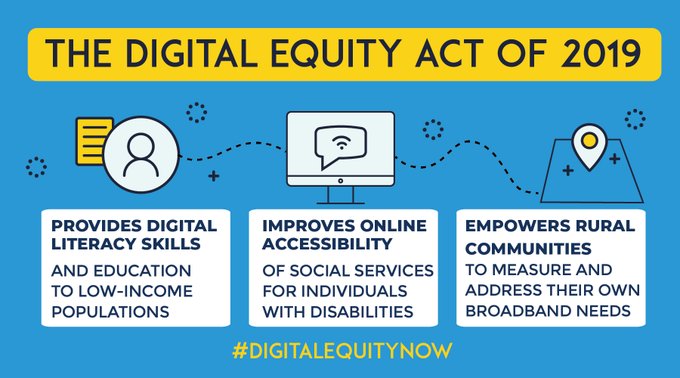United States: Digital Equity Act Unveiled
April 11, 2019
Groups working to close the digital divide were praising the introduction Thursday of the Digital Equity Act.
The bill, announced by Sen. Patty Murray (D-Wash.)--Sen. Angus King (I-Me.) is also said to be a co-sponsor--is meant to "direct new federal investments to help people in our communities access the tools and support necessary to take full advantage of a broadband connection when they have one," according to Murray.
It is the other side of the effort to boost broadband deployment in underserved and unserved areas. Once they build it, subs need to come, as it were, which means they need to not only afford it, but know how to use it and understand the benefits. For example, discounts on online filing of auto registration renewals becomes a regressive tax for those without broadband or without the knowledge to use it.
A copy of the bill was not available, but according to bill supporter Mobile Citizen, it has $1.3 billion in federal funding for "digital inclusion" projects.
Murray tweeted the news:
36 people are talking about this Twitter Ads info and privacySenator Patty Murray ✔@PattyMurray While most of the focus has been on expanding access to broadband internet in our communities—which is critical—we must also ensure that families and workers have the digital capacity to thrive personally and professionally. #DigitalEquityNow
60 11:09 PM - Apr 11, 2019
“We applaud Sen. Murray's introduction of the Digital Equity Act," said Public Knowledge Communications Justice Fellow Alisa Valentin. "It's an important step towards ensuring that all Americans can participate in the digital age, including those most impacted by the digital divide such as people of color and low-income communities."
Cassie Bair, chief business development executive of Mobile Citizen, also lauded the legislation.
“At Mobile Citizen we believe true social equity is not possible without ensuring everyone has access to high-quality broadband internet and other digital tools," said Bair. "Lack of these vital resources affects countless Americans and creates real barriers to upward social mobility. Whether it’s a student who has difficulty completing their homework because of lack of internet access at home or it’s a low-income job seeker who has difficulty finding work because they lack the computer needed to apply for a job, the digital divide has real consequences for real people."
Source: Multichannel


